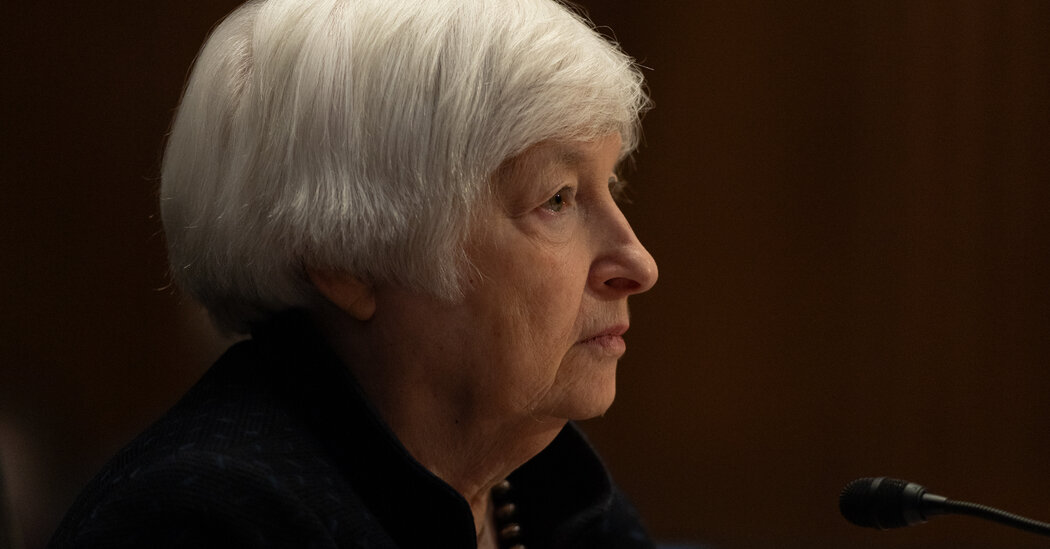Treasury Secretary Janet L. Yellen warned Israel on Thursday against cutting off ties between Palestinian and Israeli banks, arguing that such a move would further destabilize the economy of the West Bank at a time when Palestinians are already facing dire economic conditions.
Ms. Yellen’s comments came in the wake of Israel’s decision on Wednesday to withhold tax revenue from the Palestinian Authority in retaliation for three European countries unilaterally agreeing to recognize a Palestinian state. Ms. Yellen and other top economic officials from the Group of 7 nations are expected to discuss the matter and the humanitarian situation in Gaza during their summit in Stresa, Italy, which begins on Thursday.
“I’m particularly concerned by Israel’s threats to take action that would lead to Palestinian banks being cut off from their Israeli correspondent banks,” Ms. Yellen said during remarks ahead of a news conference.
Ms. Yellen added that the banking channels were critical for processing transactions that allow $8 billion a year of imports of food, fuel and electricity from Israel and $2 billion of Palestinian exports.
The war in Gaza is one of several geopolitical crises that are weighing on the global economy. The economic policymakers are also planning to discuss Russia’s war in Ukraine and continue deliberations over how to use more than $300 billion of frozen Russian central bank assets to provide Ukraine with additional aid. Officials from the Group of 7 will also be discussing ways to tighten sanctions on Russia and how to prevent China from providing the country with military support.
Ms. Yellen said on Thursday that the plight of the Palestinians would be a topic of discussion with her counterparts and that a move to cut Palestinians off from the international financial system could fuel a “humanitarian crisis.”
The Palestinian economy uses shekels, Israel’s national currency, and relies on Israeli banks to process transactions. Israel’s finance ministry usually signs an annual waiver protecting its banks from any legal exposure related to transferring funds to terrorist groups when Israeli banks facilitate transactions with Palestinians.
After granting a three-month extension of the waiver earlier this year, Israel’s hard-line finance minister, Bezalel Smotrich, indicated that he might not extend it again when it expires in July.
United Nations officials said last month that cutting off the Palestinian banks from Israel would essentially sever it from the global banking system and cripple the Palestinian economy.
On Wednesday, Mr. Smotrich also said that he informed Prime Minister Benjamin Netanyahu that he would no longer send tax revenues to the Palestinian Authority, which administers parts of the Israeli-occupied West Bank in close cooperation with Israel. Israeli and Palestinian leaders had earlier this year agreed to a deal stipulating that Norway would hold some of the revenues in trust until Israel agreed they could be sent to the Palestinians. On Wednesday, Mr. Smotrich called for the government to immediately annul that agreement.
The Biden also criticized the decision to restrict Palestinians from gaining access to the tax revenues.
“Israel’s withholding of revenues that it collects on behalf of the Palestinian Authority also threatens economic stability in the West Bank,” Ms. Yellen said. “We and our partners need to do everything possible to increase humanitarian assistance to Palestinians in Gaza, to curtail violence in the West Bank, and to stabilize the West Bank’s economy.”
The Treasury secretary declined to say what repercussions Israel could face if it followed through with the threat of cutting off Palestinian banks, suggesting that the United States and other Group of 7 nations would rely on diplomatic pressure.
“I would expect other countries to express concern about the impact such a decision on the West Bank economy,” Ms. Yellen said. “I think this would have a very adverse effect also on Israel.”
In February, Ms. Yellen wrote a letter to Mr. Netanyahu urging him increase commercial engagement with the West Bank, contending that doing so was important for the economic welfare of both Israelis and Palestinians.
